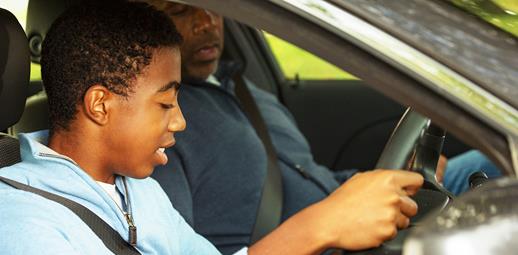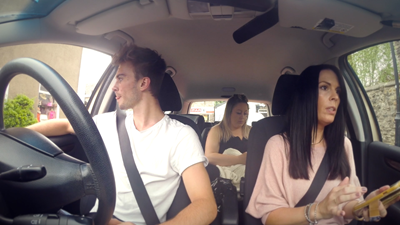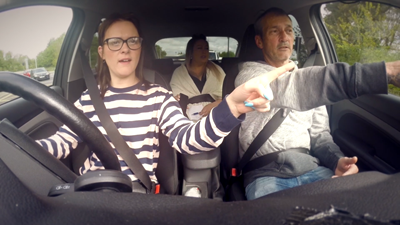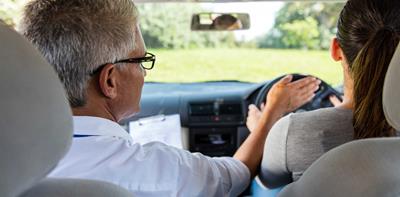
Learning to drive is a rite of passage for many young people, the first real step towards independence.
Thankfully there are plenty of things parents can do to give their children a helping hand when it comes to building confidence behind the wheel and passing their driving test.
Start young
While you can’t get out on a public road until the age of 17, it’s still possible for youngsters to learn some driving skills long before then.
The Young Driver scheme from Vauxhall allows children as young as ten to get lessons with fully qualified instructors. The idea is that giving lessons earlier on normalises how to be safe behind the wheel. So, they will be more comfortable - and safe - when they eventually pass their test.
Brush up your skills
Rebecca Ashton, head of policy and research at road safety charity IAM RoadSmart, recommends that parents ensure they’re up to date with the Highway Code and the latest advice for good driving. After all, the rules of the road have changed frequently over the years.
She says: “Consider taking a driving lesson yourself, so you know which naughty little habits have slipped in without you noticing. For example, when you learnt to drive you might have been taught to go down through the gears when coming to a stop, but these days this is not strictly true and you can slow down and stop in the gear you are in.”
Show me, tell me
Today’s driving test requires the driver to answer a series of ‘show me/tell me’ questions to demonstrate they understand all the vital car safety and maintenance checks.
Mark Barclay, ecommerce manager at GSF Car Parts, suggests this is a simple area where parents can help their children develop their skills. “While your child is learning to drive, you should carry out these checks with them each time you and your child get into the car, so that they can become familiar with them,” he explains.
“Even if your child isn’t driving, it’s still a good idea to conduct these checks together regularly,” he adds.
Work with the instructor
If your child is taking lessons with a driving instructor, then it’s a good idea to speak to the instructor about what specific areas they’re working on. That will help you decide how to focus your own efforts coaching your child.
Rebecca says: “It’s not a competition between you and the instructor, but a joint venture. So, talk to each other and maybe even go out on the odd lesson just to observe. But don’t be tempted to join in and start offering your advice.”
When are we going out?
Helping your child learn to drive is a serious time commitment and it’s easy to let other things get in the way. So, Rebecca suggests scheduling in a specific time to go out driving with your child, just as they would arrange a formal driving lesson in advance.
She says: “Learning to drive is a serious business and should be treated as such. Having the time planned together will help keep everyone focused and those off-the-cuff outings are then just an added bonus.”
Plan your routes
Just as it helps to plan in advance when you are going to go out driving with your child, it’s also important to consider exactly where you’ll be going.
This is particularly true in the early stages of learning, and the Royal Society for the Prevention of Accidents (RoSPA) recommends avoiding heavy traffic or tricky sections of road.
The charity also suggests starting with short and less demanding drives, as learners can get tired and lose concentration easily.
Keep it positive
Rebecca points out that it can be very easy to focus on what the learner did wrong. But not enough time is spent praising them for what they did well.
“Very often this is one thing that gets overlooked - it’s such a shame to miss an opportunity to say how proud of them you are and how well you think they are doing,” she says.
Keep a record
The Driver and Vehicle Standards Agency has designed a driver’s record, to help learners keep track of how they are progressing and what areas need work.
Filling it out and reviewing it together can help your child focus on where they can improve, and boost their chances of passing the test.
Talk about peer pressure
Author and teen expert, Nicola Morgan, points out that peer pressure can present a real challenge for younger drivers, who may feel the need to drive differently - perhaps more aggressively or competitively - if they are in the car with friends.
She says: “Make sure they know that whenever they get behind the wheel of a car, they’re in control. Give them the tools to assert themselves. For example, they could remind their friends that they’re new to driving and need their full concentration to focus on the road.”
Talk about overtaking cyclists
According to the police, around one in four serious collisions between cyclists and large vehicles are the result of cars “passing too close” to cyclists. So, it’s important to teach your child how to overtake them safely or wait patiently when it’s not safe to do so.
Parents can help ensure their children are ready to share the road safely with cyclists by showing them the ‘Too Close for Comfort’ virtual reality film from Cycling UK.
Consider the alternatives
Road safety charity Brake argues that it’s important for parents to educate their children about the alternatives to driving, and to explain the benefits, such as saving money.
The charity says: “If they are determined to learn to drive, you could offer an incentive to delay, for example offering to pay for their driving lessons if they wait until they are 21, or funding their use of public transport in the meantime."
Whenever you and your child decide it’s time for them to learn how to drive, taking the time to prepare and going about it patiently can make a huge difference in how safe and confident they are when they get behind the wheel.
Manage your account online
It's easy to manage your insurance online - make a change, review your cover, renewal options and more.
Go to Solved to read more about driving, the rules of the road and road safety.
You can find out more about our car insurance here.


